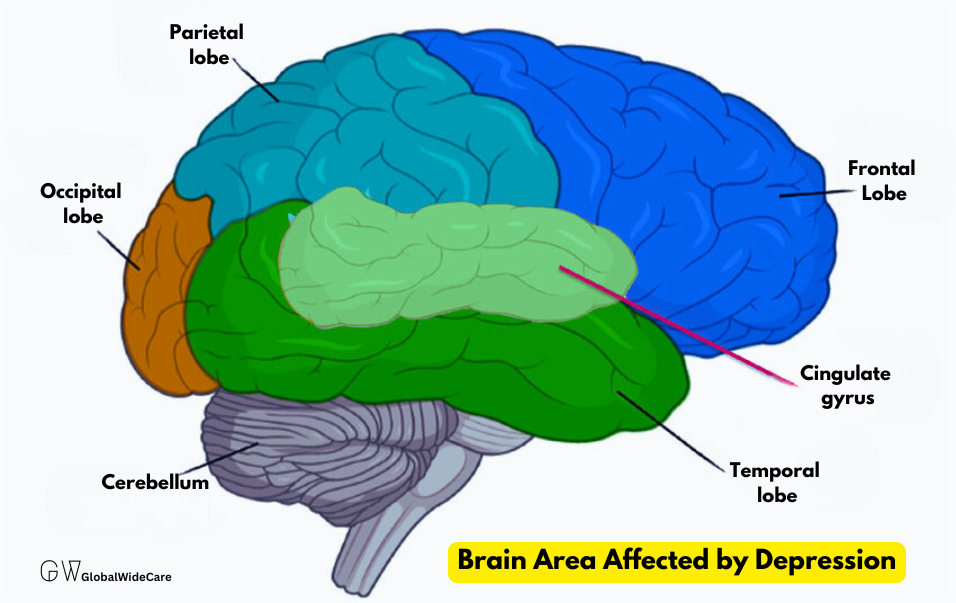Did you know that depression, also known as Major Depressive Disorder (MDD), is often referred to as the “silent epidemic”? Despite being one of the most common mental health conditions globally, it often goes undiagnosed or untreated. Depression doesn’t just affect your mind; it can also have profound effects on your physical health, relationships, and overall quality of life. If you’ve ever felt overwhelmed by sadness, or if you’re trying to understand what someone you care about is going through, this guide is here to help. Let’s explore everything you need to know about despair in a way that is both informative and engaging.

Table of Contents
What Exactly is Depression?
Depression is a complex mental health condition that goes far beyond feeling sad or having a bad day. It’s a pervasive disorder that can alter every aspect of a person’s life, making even the simplest tasks feel insurmountable. But what exactly sets despair apart from everyday sadness? Here’s what you need to know:
- Persistent Sadness: While everyone feels down from time to time, the sadness associated with despair is more intense and persistent. It often lasts for weeks, months, or even years, regardless of circumstances.
- Loss of Interest and Pleasure: One of the hallmark signs of despair is anhedonia, which is the inability to feel pleasure in activities that once brought joy. This can include hobbies, socializing, or even eating your favorite foods.
- Physical Symptoms: Depression doesn’t just affect your mind; it can also cause a variety of physical symptoms. These can include chronic fatigue, headaches, digestive issues, and unexplained aches and pains. It’s not uncommon for people with despair to visit their doctor with physical complaints, only to discover that despair is the underlying cause.
- Cognitive Impairments: Depression can affect your ability to think clearly. You might find it difficult to concentrate, make decisions, or remember things. This cognitive fog can make it hard to function in daily life, affecting work performance and personal relationships.
- Suicidal Thoughts: In severe cases, despair can lead to thoughts of suicide or self-harm. This is why it’s so important to seek help if you or someone you know is struggling with despair.
Why Depression is Often Overlooked?
Depression is sometimes called the “silent epidemic” because it often goes undiagnosed or untreated. There are several reasons for this:
- Stigma: Despite advances in mental health awareness, there is still a significant stigma attached to despair. Many people feel ashamed to admit they are struggling, fearing judgment or discrimination.
- Lack of Awareness: Some people may not recognize the symptoms of despair in themselves or others. They might attribute their feelings to stress, burnout, or simply “having a bad day.”
- Cultural Factors: In some cultures, mental health is not discussed openly, and seeking help for despair can be seen as a sign of weakness. This cultural stigma can prevent people from getting the help they need.
- Gender Differences: Depression can manifest differently in men and women, leading to underdiagnosis in certain groups. For example, men are more likely to express despair through anger or irritability, rather than sadness, which can be overlooked.
Causes of Depression
Depression is not caused by a single factor. Instead, it’s the result of a complex interplay of genetic, biological, environmental, and psychological factors. Understanding these causes can help demystify the condition and guide more effective treatments.
- Genetics: Research shows that despair can run in families, suggesting a genetic component. If you have a parent or sibling with despair, your risk of developing the condition may be higher. However, genetics is not destiny, and many people with a family history of depression never develop the condition themselves.
- Biological Differences: Brain imaging studies have shown that people with despair often have physical differences in their brains. These changes can affect how the brain processes emotions and stress, making some people more vulnerable to despair.
- Neurotransmitters: The brain’s chemical messengers, known as neurotransmitters, play a crucial role in regulating mood. Imbalances in neurotransmitters like serotonin, dopamine, and norepinephrine are often associated with despair. Antidepressant medications work by adjusting these chemical levels, helping to restore balance.


- Hormonal Influences: Hormonal fluctuations can trigger despair, especially in women. Events like pregnancy, childbirth, and menopause are associated with increased risk of despair due to changes in hormone levels. Men can also experience depression linked to hormonal changes, particularly in response to stress or aging.
- Environmental Stressors: Life events such as the loss of a loved one, divorce, or financial difficulties can trigger despair, especially in individuals who are already predisposed to the condition. Chronic stress, whether from work, relationships, or health problems, can also contribute to the development of depression.
- Psychological Factors: Low self-esteem, negative thinking patterns, and a history of trauma or abuse can all increase the risk of depression. People who are prone to rumination, or obsessing over negative thoughts, are particularly vulnerable.
Recognizing Depression in Yourself and Others
Early recognition of depression is key to getting the help you need. Depression can look different in different people, but there are some common signs and symptoms to watch for:
- Emotional Symptoms:
- Persistent sadness or hopelessness
- Irritability or anger, even over small issues
- Feelings of worthlessness, guilt, or self-blame
- Loss of interest in activities or hobbies
- Physical Symptoms:
- Changes in appetite (eating too much or too little)
- Sleep disturbances (insomnia or sleeping too much)
- Fatigue and lack of energy
- Unexplained physical symptoms, such as headaches or stomachaches
- Behavioral Symptoms:
- Withdrawing from social activities or relationships
- Neglecting personal hygiene or self-care
- Difficulty concentrating or making decisions
- Engaging in risky or reckless behaviors


The Silent Signs of Depression: What You Might Miss
Not all symptoms of depression are obvious. Some people with depression might appear to be functioning well on the outside, even though they are struggling internally. These are often referred to as “high-functioning” despair or “smiling depression.” Here are some subtle signs to watch for:
- Perfectionism: People with high-functioning despair may set unrealistically high standards for themselves and feel like failures when they don’t meet them. This constant pressure can lead to burnout and exhaustion.
- Overworking: Some individuals may throw themselves into work or other activities to distract themselves from their feelings. While this might seem productive, it can actually be a sign of despair.
- Chronic Indecisiveness: Difficulty making decisions, even about small matters, can be a sign of despair. This indecisiveness often stems from a fear of making the wrong choice.
- Substance Abuse: People with despair might turn to alcohol, drugs, or other substances as a way to cope with their emotions. This can lead to a dangerous cycle of dependence and worsening depression.
How to Treat Depression?
Treating depression requires a comprehensive approach that addresses both the symptoms and underlying causes. The good news is that with the right treatment plan, most people with despair can experience significant improvement in their symptoms.
- Psychotherapy: Also known as talk therapy, psychotherapy is a cornerstone of despair treatment. Cognitive-behavioral therapy (CBT) is particularly effective in helping individuals identify and change negative thought patterns. Other forms of therapy, such as interpersonal therapy (IPT) and psychodynamic therapy, can also be beneficial.
- Medication: Antidepressants are commonly prescribed to help regulate brain chemistry. There are several different types of antidepressants, including SSRIs (Selective Serotonin Reuptake Inhibitors), SNRIs (Serotonin-Norepinephrine Reuptake Inhibitors), and atypical antidepressants. It’s important to work with a healthcare provider to find the right medication and dosage, as each person’s response to medication can vary.
- Lifestyle Changes: Simple lifestyle changes can have a profound impact on your mental health. Regular physical activity, a balanced diet, and adequate sleep are essential for overall well-being. Exercise, in particular, has been shown to boost mood by releasing endorphins, which are natural mood enhancers.
- Social Support: Having a strong support system can make a big difference in your recovery. Whether it’s talking to friends, family, or a support group, connecting with others can help you feel less isolated and more understood.
- Alternative Therapies: In addition to traditional treatments, some people find relief through alternative therapies such as acupuncture, yoga, or herbal supplements like St. John’s Wort. It’s important to consult with a healthcare provider before starting any new treatment to ensure it’s safe and appropriate for you.
- Mindfulness and Meditation: Mindfulness practices, such as meditation and deep breathing exercises, can help you stay grounded and reduce symptoms of anxiety and depression. These practices can also improve your ability to manage stress and negative emotions.
Self-Help Strategies: Empowering Yourself to Overcome Depression
While professional treatment is essential, there are also self-help strategies you can use to manage your despair. These strategies can complement your treatment plan and help you regain a sense of control over your life.
- Set Realistic Goals: Depression can make even the simplest tasks feel overwhelming. By setting small, achievable goals each day, you can build momentum and regain a sense of accomplishment. Celebrate your successes, no matter how small they may seem.
- Practice Self-Compassion: It’s important to be kind to yourself when you’re struggling with despair. Avoid self-criticism and remind yourself that it’s okay to have bad days. Treat yourself with the same compassion you would offer a friend.
- Engage in Activities You Enjoy: Even if you don’t feel like doing anything, try to engage in activities that you used to enjoy. This can help rekindle your interest and lift your mood. Whether it’s reading, painting, or spending time in nature, find something that brings you a sense of peace.
- Limit Negative Influences: Pay attention to the people and situations that drain your energy or make you feel worse. It’s okay to set boundaries and limit your exposure to negative influences. Surround yourself with positivity and seek out uplifting experiences.
- Seek Out Humor: Laughter really is the best medicine. Watching a funny movie, reading a humorous book, or spending time with someone who makes you laugh can provide a much-needed mood boost.
When to Seek Help?
If you or someone you know is experiencing symptoms of despair that are interfering with daily life, it’s important to seek professional help. Here are some signs that it’s time to reach out to a mental health professional:
- Symptoms Persisting for Two Weeks or More: If your symptoms have lasted for more than two weeks and are not improving, it’s time to seek help. Early intervention can prevent despair from worsening.
- Inability to Function: If despair is making it difficult to perform everyday tasks, such as going to work or taking care of yourself, professional treatment is necessary.
- Suicidal Thoughts: If you are experiencing thoughts of suicide or self-harm, seek immediate help. This is a medical emergency, and it’s crucial to reach out to a healthcare provider, a crisis hotline, or go to the nearest emergency room.
- Unexplained Physical Symptoms: If you’re experiencing physical symptoms, such as chronic pain or digestive issues, that have no apparent cause, it’s worth exploring whether despair could be the underlying issue.


External Resources for More Information
For more information on depression and mental health, consider exploring the following resources:
- National Institute of Mental Health (NIMH): www.nimh.nih.gov
- Mental Health America (MHA): www.mhanational.org
- American Foundation for Suicide Prevention (AFSP): www.afsp.org
- Depression and Bipolar Support Alliance (DBSA): www.dbsalliance.org
Conclusion
Depression can feel like an insurmountable challenge, but it’s important to remember that you are not alone. With the right treatment and support, recovery is possible. Whether you’re seeking help for yourself or someone you care about, taking that first step is the most important part of the journey. Reaching out for help is a sign of strength, not weakness, and it can lead to a brighter, healthier future. Remember, small steps forward can lead to significant changes, and there’s always hope, no matter how dark things may seem.